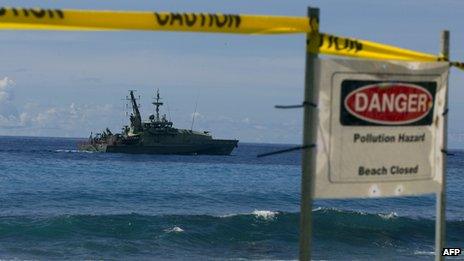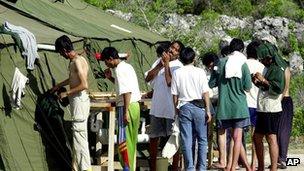Is Australia asylum U-turn a 'better option'?
- Published

Australia wants to deter asylum seekers making the journey by boat
In one of the most spectacular political U-turns in recent Australian history, the Labor government is poised to reopen immigration camps in the South Pacific.
Offshore processing centres for asylum seekers at Manus Island in Papua New Guinea and on the tiny republic of Nauru could be working again within a month as a controversial policy that was scrapped in 2008 is revived.
The government had repeatedly refused to consider a return to the "Pacific Solution" championed by former Prime Minister John Howard, but a steady flow of asylum seekers arriving by sea and scores of deaths on unseaworthy boats have, along with growing political pressure, forced a dramatic rethink.
Laws have been approved by Australia's lower house, following recommendations from a panel of independent experts. The bill is expected to be ratified later this week by the upper chamber, the Senate, with support of both the governing Labor Party and the conservative opposition.
In Canberra the parliamentary debate has been long and particularly bruising, even by Australia's bare-knuckle standards.
"Over the last two days we have witnessed the public humiliation of a government that is too arrogant, too stubborn and too stupid to acknowledge its abject policy failings," raged the deputy opposition leader Julie Bishop.
Facing the taunts was the stern face of Prime Minister Julia Gillard, who said that after months of disagreement, a deal was urgently needed.
"My view is that the time for the political point-scoring, the yelling, the shouting, that time is over; people want to see action," said the Welsh-born Labor leader, as she urged her fellow parliamentarians to pass the bill.
'Wrong'
Reopening camps in Papua New Guinea's rugged north and on Nauru, a tiny speck south of the Marshall Islands, is a major policy backflip. Back in 2003, Ms Gillard had in opposition denounced the Howard government's asylum policies.
"Labor will end the Pacific Solution, the processing and detaining of asylum seekers on Pacific islands, because it is costly, unsustainable and wrong as a matter of principle," she insisted at the time.
Almost a decade later, some of her parliamentary colleagues have pilloried her for abandoning her values.
Independent MP Andrew Wilkie condemned the offshore processing legislation, labelling it a return to the unscrupulous policies of the past.
''This is very disappointing,'' he told ABC radio. ''The Howard-era Pacific Solution was deeply unethical and it was arguably illegal."
The Greens also voted against the government's bill as the left-of-centre party accused ministers of betraying the despairing and vulnerable, who were seeking Australia's protection, but could be doomed to spend years in dusty camps in the South Pacific.
"This is just a completely unworkable, inhumane, unthinkable proposition, to dump children on a remote island for decades to come simply because the government of the day wants to look tough on refugees in order to win the next election," argued the Greens' Senator Sarah Hanson Young.
'Better option'

Australia's asylum camp in Nauru was closed in 2008
In the end, lawmakers voted for what many consider to be a harsh, but necessary circuit-breaker: strict measures that will deter asylum seekers and save lives.
"I don't like offshore processing but if it stops people from drowning then it has to be a better option and I think it's time that politicians from all sides ate some humble pie and fixed this thing," explained independent Senator Nick Xenophon.
This week more boats have been intercepted in Australian waters. The asylum seekers on board could become the first detainees on Nauru and Manus Island but will the new legislation deter others?
The International Federation of Iranian Refugees believes it will not. It insists that Canberra has an obligation to protect those seeking asylum and should not be deporting them.
"You're talking about desperate people. They're fleeing from persecution. In spite of all this, they would still risk their lives getting [on a] leaking boat to be able to get a safe place… to get re-settled," explained the federation's spokesman in Australia, Arsalan Nazeri.
- Published13 August 2012
- Published28 June 2012
- Published25 June 2012
- Published22 June 2012
- Published24 January 2012
- Published19 December 2011